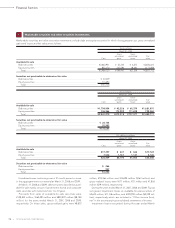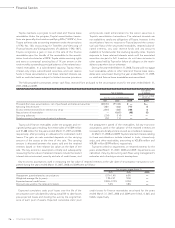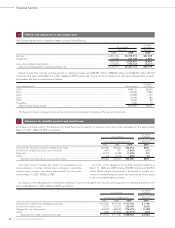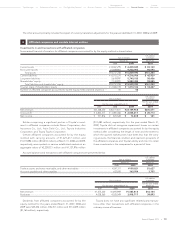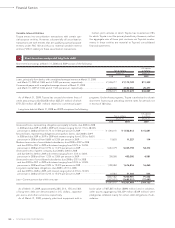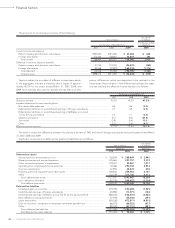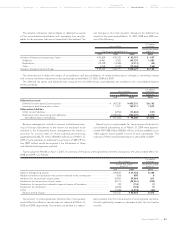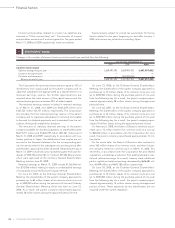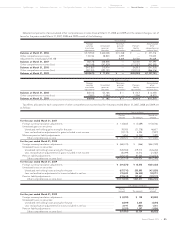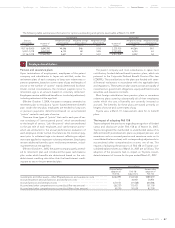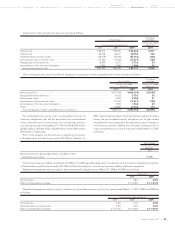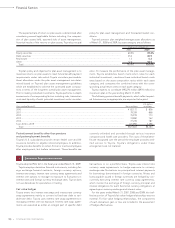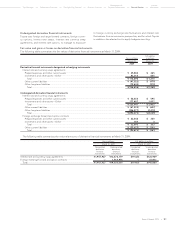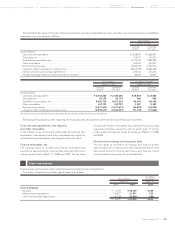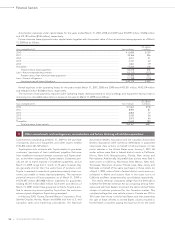Toyota 2009 Annual Report Download - page 86
Download and view the complete annual report
Please find page 86 of the 2009 Toyota annual report below. You can navigate through the pages in the report by either clicking on the pages listed below, or by using the keyword search tool below to find specific information within the annual report.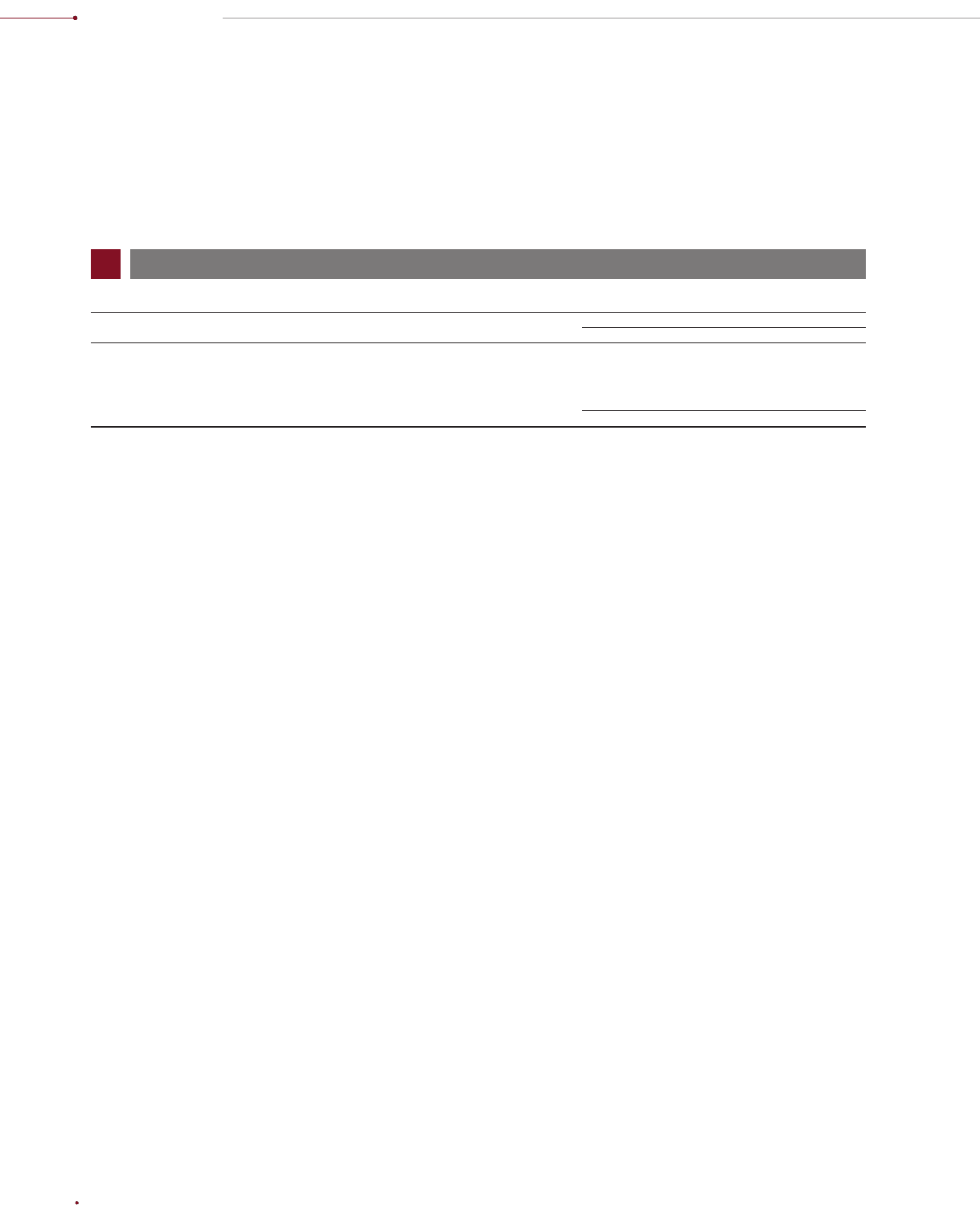
Financial Section
TOYOTA MOTOR CORPORATION
84
The Corporation Act provides that an amount equal to 10% of
distributions from surplus paid by the parent company and its
Japanese subsidiaries be appropriated as a capital reserve or a
retained earnings reserve. No further appropriations are
required when the total amount of the capital reserve and the
retained earnings reserve reaches 25% of stated capital.
The retained earnings reserve included in retained earnings
as of March 31, 2008 and 2009 was ¥160,229 million and
¥167,722 million ($1,707 million), respectively. The Corporation
Act provides that the retained earnings reserve of the parent
company and its Japanese subsidiaries is restricted and unable
to be used for dividend payments, and is excluded from the cal-
culation of the profit available for dividend.
The amounts of statutory retained earnings of the parent
company available for dividend payments to shareholders were
¥6,073,271 million and ¥5,624,709 million ($57,261 million) as of
March 31, 2008 and 2009, respectively. In accordance with cus-
tomary practice in Japan, the distributions from surplus are not
accrued in the financial statements for the corresponding peri-
od, but are recorded in the subsequent accounting period after
shareholders’ approval has been obtained. Retained earnings at
March 31, 2009 include amounts representing year-end cash div-
idends of ¥109,756 million ($1,117 million), ¥35 ($0.36) per share,
which were approved at the Ordinary General Shareholders’
Meeting, held on June 23, 2009.
Retained earnings at March 31, 2009 include ¥1,363,044 mil-
lion ($13,876 million) relating to equity in undistributed earnings
of companies accounted for by the equity method.
On June 23, 2005, at the Ordinary General Shareholders’
Meeting, the shareholders of the parent company approved to
purchase up to 65 million shares of its common stock at a cost
up to ¥250,000 million during the period until the next Ordinary
General Shareholders’ Meeting which was held on June 23,
2006. As a result, the parent company repurchased approxi-
mately 38 million shares during the approved period of time.
On June 23, 2006, at the Ordinary General Shareholders’
Meeting, the shareholders of the parent company approved to
purchase up to 30 million shares of its common stock at a cost
up to ¥200,000 million during the purchase period of one year
from the following day. As a result, the parent company repur-
chased approximately 28 million shares during the approved
period of time.
On June 22, 2007, at the Ordinary General Shareholders’
Meeting, the shareholders of the parent company approved to
purchase up to 30 million shares of its common stock at a cost
up to ¥250,000 million during the purchase period of one year
from the following day. As a result, the parent company repur-
chased 30 million shares during the approved period of time.
On February 5, 2008, the Board of Directors resolved to pur-
chase up to 12 million shares of its common stock at a cost up
to ¥60,000 million in accordance with the Corporation Act. As a
result, the parent company repurchased approximately 10 mil-
lion shares.
On the same date, the Board of Directors also resolved to
retire 162 million shares of its common stock, and then the par-
ent company retired its common stock on March 31, 2008. This
retirement, in accordance with the Corporation Act and related
regulations, is treated as a reduction from additional paid-in cap-
ital and retained earnings. As a result, treasury stock, additional
paid-in capital and retained earnings decreased by ¥646,681 mil-
lion, ¥3,499 million and ¥643,182 million, respectively.
On June 24, 2008, at the Ordinary General Shareholders’
Meeting, the shareholders of the parent company approved to
purchase up to 30 million shares of its common stock at a cost
up to ¥200,000 million during the purchase period of one year
from the following day. As a result, the parent company repur-
chased approximately 14 million shares during the approved
period of time. These approvals by the shareholders are not
required under the current regulation.
Changes in the number of shares of common stock issued have resulted from the following:
For the years ended March 31,
2007 2008 2009
Common stock issued
Balance at beginning of year ................................................................................................ 3,609,997,492 3,609,997,492 3,447,997,492
Issuance during the year ....................................................................................................... — — —
Purchase and retirement ....................................................................................................... — (162,000,000) —
Balance at end of year ....................................................................................................... 3,609,997,492 3,447,997,492 3,447,997,492
Interest and penalties related to income tax liabilities are
included in “Other income (loss), net”. The amounts of interest
and penalties accrued as of and recognized for the years ended
March 31, 2008 and 2009, respectively, were not material.
Toyota remains subject to income tax examination for the tax
returns related to the years beginning on and after January 1,
2000, with various tax jurisdictions including Japan.
Shareholders’ equity:
17


